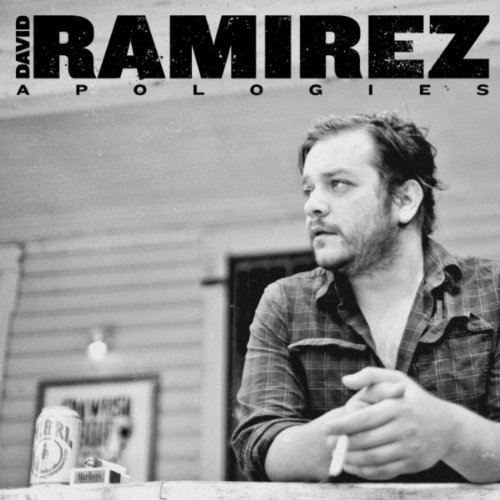 Although Austin-based singer-songwriter David Ramirez has released several recordings over the past few years, it’s clear from the first track that there is something uniquely intimate about Apologies. It’s recently become the trend for singer-songwriters to pare down their music, becoming more acoustic and writing lyrics that are more real and emotional. Ramirez takes this trend to the extreme—his vocals are rough around the edges, and on many tracks he is only accompanied by an acoustic guitar—but he shies away from the usual generic, contrived lyrics about hardship and heartbreak, instead opting to reveal extremely intimate feelings about family, relationships, and regret. The result is an album that is personal, gritty, and incredibly raw. In an interview with Paste magazine, he admits that “I’ve never been more personal with an album than I am with Apologies… I fear I may have been too open.” Indeed, over the course of the album, the listener is shown a brutally honest look inside the struggles and stories that have gone into the making of Apologies.
Although Austin-based singer-songwriter David Ramirez has released several recordings over the past few years, it’s clear from the first track that there is something uniquely intimate about Apologies. It’s recently become the trend for singer-songwriters to pare down their music, becoming more acoustic and writing lyrics that are more real and emotional. Ramirez takes this trend to the extreme—his vocals are rough around the edges, and on many tracks he is only accompanied by an acoustic guitar—but he shies away from the usual generic, contrived lyrics about hardship and heartbreak, instead opting to reveal extremely intimate feelings about family, relationships, and regret. The result is an album that is personal, gritty, and incredibly raw. In an interview with Paste magazine, he admits that “I’ve never been more personal with an album than I am with Apologies… I fear I may have been too open.” Indeed, over the course of the album, the listener is shown a brutally honest look inside the struggles and stories that have gone into the making of Apologies.
The first four tracks of the album set the stage, with Ramirez questioning his upbringing, struggling with his faith, and reflecting on the regrets he has about his relationships with his friends and family. Chapter II, the first track, sets the tone with quiet, folky melodies, and soul-searching lyrics: “Buried underneath all the women and the booze / Is a man that I know is ashamed of what I choose.”
“Stick Around,” the third track on the album, (also released as a single) is perhaps the strongest track on Apologies. In it, Ramirez grapples with his identity as a wandering man. Even though he desperately wants something or someone to ground him and hold him down, when it all comes down to it, he doesn’t have a reason to stay. “Maybe I go because I’m chasing something / Maybe I go because something is chasing me / Maybe I leave because I’ve yet to find someone / to look me in the face and say / Stick around.” A bit harder than some of the other tracks on the album, unexpected chord progressions and a continual drumbeat drive the track forward musically, and make the lyrics match the melody beautifully. The one-two punch of music and lyrics makes “Stick Around” heartbreakingly human and relatable, because who hasn’t at some point experienced the desperate longing to be wanted by someone?
The rest of the album is more upbeat and almost wistful, both lyrically and musically. In “Kindness” and “Goodbye,” Ramirez seems to have finally come to terms with some of the unanswered questions and unfinished relationships that made the first half of the album so mournful, and is moving on to better things. “One day if my love decided not to be / Well I’d just shrug and let them leave.” Even though it is clear from the fragile melody and quiet, tentative vocals that Ramirez is still hurting, there is also an undeniable thread of hope woven through the tracks. In the artist bio on his website, he states “I see a lot of hope in these songs.”
The hopefulness really shines through—as do Ramirez’s Texan roots—in “Mighty Fine” and “Dancing and Vodka,” upbeat ballads that sound like something straight out of a Southern dive bar. Twangy guitars and rough vocals that slide through the melody with a bit of a drawl are paired with sweetly cliché lines about girlfriends and lovers, resulting in two tracks that really contrast and stand out from the rest of the usually calm and reflective album. The last track, “Find the Light” takes Apologies full circle, returning to the quiet and folky musicality of the first half of the album, while retaining the hope and optimism that Ramirez was able to find in the second. The lyrics are full of wisdom gained from struggle, and it seems like for the first time, he has found peace and come to terms with his heartbreak. “As the sun sets the moon begins to rise / So even in the darkness you’ll find the light.”
Despite being rugged and raw, altogether, Apologies is surprisingly coherent and polished. Though he has been writing and releasing music for the better part of ten years, this is clearly his best work, and has landed him with a music feature in the New York Times, as well as an upcoming national tour with Seattle artist Noah Gundersen. Although it is an undoubtedly personal album, Ramirez is able to present his struggles in a way that makes them extremely relatable and relevant on a grander scale. is an emotional roller coaster, but one that is well worth the ride.

